
Gonorrhea
Gonorrhea is the second most common bacterial sexually transmitted infection (STI) worldwide. It causes different symptoms in women and men.
Women often feel no symptoms, but untreated infection can lead to infertility and problems during pregnancy. Gonorrhea can be passed from a pregnant mother to her baby, causing an eye infection in the newborn. This infection can result in pus discharge and swollen eyelids, and if untreated, it may lead to scarring and blindness. Common symptoms in men include pain or burning during urination, discharge from the penis, and sometimes pain in the testes. Rectal and pharyngeal infections in both men and women are largely asymptomatic. Gonorrhea also increases the risk of acquiring and transmitting HIV (AIDS).
Gonorrhea can be treated and cured with antibiotics. However, it has become increasingly difficult to treat due to its high resistance to antibiotics. This resistance means that older, more affordable antibiotics are no longer effective, and there is a risk that gonorrhea could become untreatable in the future. It is important to use antibiotics responsibly and develop new ones to combat this growing threat.
Clinical trials
A ‘clinical trial’ is a research study in which a potential new treatment is investigated to prevent, cure or improve a disease or medical condition. A clinical trial also looks at how participants react to the potential new treatment and if any unwanted effects occur. This helps to determine if the new investigational treatment works, is safe, and is better than those that are already available. Many clinical trials also compare existing treatments or test new ways to use or combine with existing treatments.
All new drugs must be tested in clinical trials before they can be prescribed to patients. Without people taking part in these research studies, we would have no new drugs to help others with their condition.
Clinical trial of Debio 1453 in healthy volunteers
Debio 1453-101 is a Phase 1, randomized Definition ‘Randomized’ means that participants are assigned to different groups by chance, like flipping a coin. , double-blind Definition ‘Double-blind’ means neither the participants nor the researchers know who is receiving the actual treatment and who is receiving a placebo. clinical trial carried out to test the safety, tolerability, and how the body processes different doses of a new drug, Debio 1453, compared to a placebo Definition A placebo is a substance that has no therapeutic effect . The trial will help define the recommended doses for the next steps of the clinical development of Debio 1453. Only healthy volunteers without gonorrhea can participate in this trial.
Debio 1453 is a new antibiotic being developed to treat gonorrhea, especially for varieties of bacteria resistant to existing antibiotics. This is the first time that Debio 1453 will be administered to people. Laboratory tests have shown that Debio 1453 could potentially help in the treatment of gonorrhea.
The Debio 1453-101 trial is divided into 2 parts:
Part 1 – Single ascending dose (SAD)
Each participant will randomly receive one oral dose of either the new drug (Debio 1453) or placebo Definition A placebo is a substance that has no therapeutic effect .
Part 2 – Multiple ascending dose (MAD)
Each participant will randomly receive several oral doses of either the new drug (Debio 1453) or placebo Definition A placebo is a substance that has no therapeutic effect .
You may be able to take part if:
- You are willing to adhere to study plans and procedures.
- Your Body Mass Index is between 18.5 and 30.0.
- You do not suffer from serious health problems.
- You have no history of chronic drug or alcohol abuse in the last 2 years.
-
Phases
When a potential new medication is being developed, it is first tested in a laboratory setting. If the results are positive, the drug may enter a clinical trial program. This means that it will be tested in humans in several ‘phases’ of study.
Phase I = Safety evaluation. The very first administration in humans, typically carried out in a small group of healthy volunteers to assess if the drug is safe.
Phase II = Efficacy evaluation. The first trials in patients with the intended disease to check if the drug works efficiently and if there are any unwanted side effects.
Phase III = Confirming findings. Trials in large numbers of patients that generally compare the drug to the best treatments available.
_Phases
- P
- Ⅰ
- Ⅱ
- Ⅲ
- M
Talk with your medical doctor
If you are interested in participating in an upcoming clinical trial (can be also referred to as a clinical study), ask your doctor if a clinical trial might be right for you. Your doctor knows both you and your health history, which is invaluable in making this decision. Your doctor can help you gather the information needed to locate a trial and help you identify what questions might be important to ask the clinical trial doctor before deciding to participate.
Find the trials on the map
This map relies on Google Maps, which could install cookies.
Please accept them in order to show the map.
Please share any related associations that may be useful